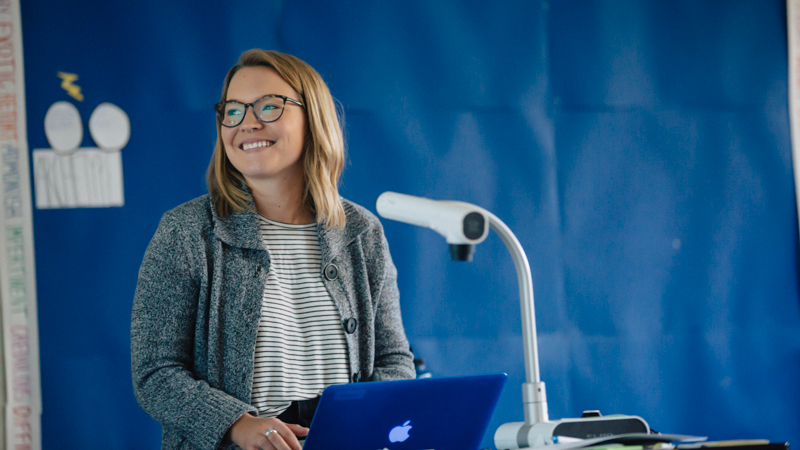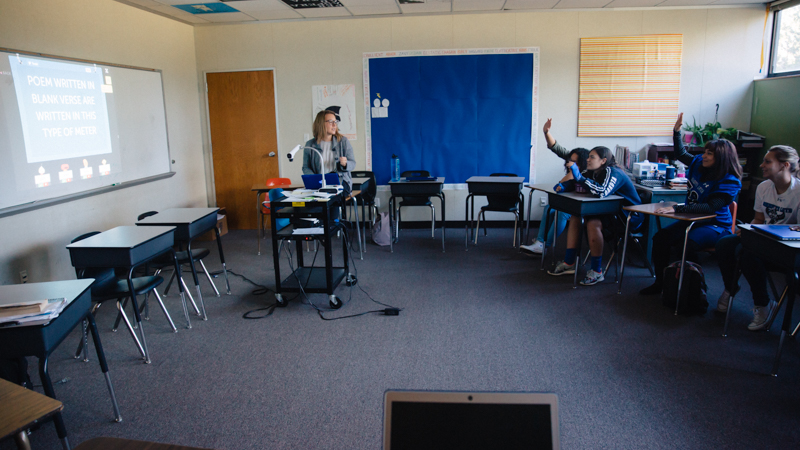←BACK
Meet Our Teachers! Abigail Wotton
September 21, 2017
|
|
Abigail Wotton didn’t initially see herself as an educator. She studied English in college and graduate school and pursued work in journalism—all while writing her own works of fiction along the way. (In fact, she was just nominated for PEN/Robert J. Dau Short Story Prize for Emerging Writers for her short story “I Am the Real Gecko.”)
But as Abby completed her master’s degree, she also discovered a love for being in the classroom and for serving as part of a school community. Two years ago that discovery led her from her home in Massachusetts to the Pine Ridge Reservation. Today, as a member of Red Cloud’s Volunteer Program, she teaches English and literature to Red Cloud juniors and seniors. Abby spoke with us about her unfolding love of teaching—and how it feels to inspire her own students to write.
|

|
Tell us about finding your way here to Red Cloud.
During the second year of my master’s, I interned with CBS News in New York because I thought I wanted to be a journalist. After leaving New York I worked at an elementary school as a behavioral aid. While working at the school I realized how much I valued the community there in comparison to the isolation of working in the office at CBS.
That spring, Maka Clifford (who at the time directed Red Cloud’s volunteer program) came to visit Bridgewater’s campus. He told me about the volunteer program, and it seemed like a perfect way to gain experience being a classroom teacher as well as having the opportunity to live in community. I interviewed and then found myself driving out to South Dakota a few months later. This is my second year—and I teach English to Red Cloud’s entire 11th grade class plus one section of the AP literature class for seniors.
Given your own love of English and literature, what is it like to now teach it?
The best thing about teaching is watching students make connections. The students here are already deeply empathetic and aware, I know this firsthand from the kindness they showed me last year. As a first year teacher, generosity from your students is a true gift.
Students sometimes wonder why we read the same books, even the books high schoolers read fifteen years ago. Why do we still read Macbeth and The Crucible? We don’t always know how we might connect to Steinbeck’s migrant workers in 1930’s California, but we find we do. Reading is the only way in which we can gain access to another person’s experience, one which we might otherwise never have ourselves. This kind of alchemy, because storytelling is magic, makes us more humane. The other kind of magic that happens is that we also start to see ourselves in these characters that we initially don’t feel like we have any obvious connections to. We understand George and Lennie and their loneliness and uncertainty, we see ourselves in Macbeth and his fear. We know that we are not alone in battling, not the monsters that rage outside of the castle, but the ones within.
When students see the connections, make the connections and then feel the connective thread that holds all these stories together pulling at them, that is the best part of teaching.
|

|
You’re a writer yourself. How does that play out in the classroom?
I didn’t share that I write with any of my students until a few months into last year. They were much more excited about it than I thought they would be. I told them about a story that was being published and they just all started clapping, it was incredibly sweet.
I was apprehensive about teaching high school English without formal instruction in education, and rightly so, it was and continues to be quite the learning curve. However, I also underestimated the value of work that I have done and continue to do in my subject matter. I now think it is helpful for them to see not just a love for literature and writing, but a life devoted to it. They also share their fiction and poetry with me and I love that.
|

|
What has it been like to begin your teaching career here on Pine Ridge?
It’s incredibly humbling to learn about the challenges our students can face. Red Cloud has such a beautiful campus, and when everyone is here you can almost forget what it’s like off campus. And it’s not until I pick them up in the morning or drop them off on the bus at night do I remember where it is they are coming from.
In terms of teaching, that has been a learning process as well. At the beginning of the year, in my AP class, we spent two days talking about the value of preparing for the AP Exam in ways that exists beyond the class itself. No challenging experiences are isolated, and at the beginning of the year I expressed that taking AP Literature was not culminated in passing the exam. We talked about grit and the other characteristics that are called into play in college and beyond. Success isn’t based on intelligence alone, our patience and perseverance are equally important. College stretches us all, and in maintaining a rigorous academic environment at school, it becomes a safe place for students to be asked to meet high expectations. This is incredibly important when the impulse might be to let kids off the hook for homework and assignments when you know other things may be challenging. Ultimately though, it’s always about knowing when to temper justice with mercy. Expecting a lot from students and also providing support is key.
|
Photos © Red Cloud Indian School/Willi White '08
Want to receive more stories like this?